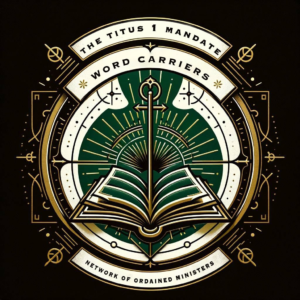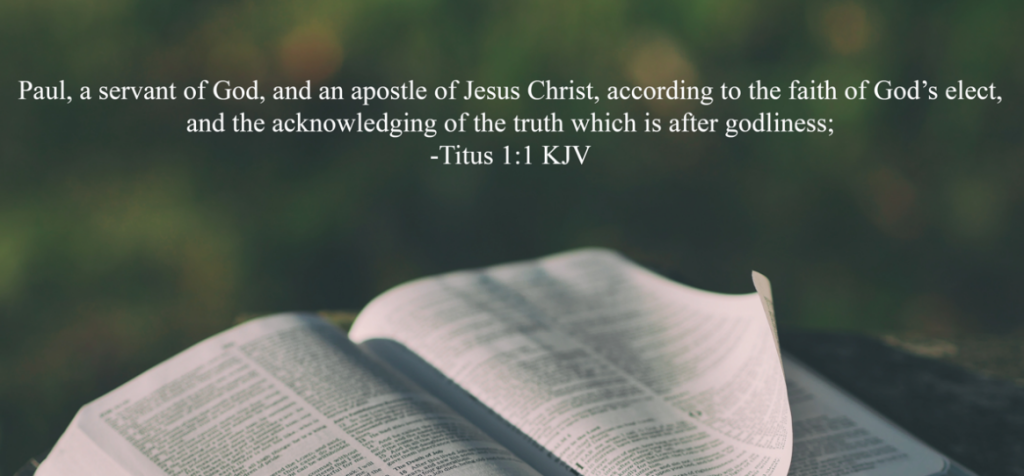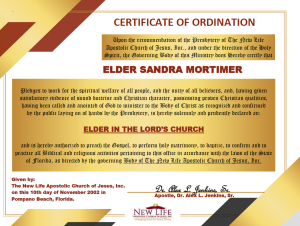Outreach Ministries
Titus Mandate
“ORDAIN ELDERS IN EVERY CITY”
Much has been said, and many articles have been written dealing with the eldership; however, it is our firm belief that we have been overlooking a most important point, elders in the church. How many elders should be ordained in every city? When we carefully examine the Lord of God, we believe that the Bible tells us the answer to this question. First, let us recognize that the Holy Spirit qualifies individuals to become elders just the same as he qualifies individuals to be Christians. In conformity and obedience to the Holy Spirit, one is made a “new creature,” a Christian; so, it is in conformity and obedience to the Holy Spirit, a Christian man or woman is made an elder. And one cannot become an elder in the sight of God until he has conformed unto the Holy Spirit. In meeting all the requirements set forth by the Holy Spirit as found in First Timothy, Chapter Three, and in Titus, Chapter One. These are clearly stated and easily understood. The qualifications are most important and cannot be overlooked.
The New Life Titus Mandate was given to our Apostle, Dr. Alex L. Jenkins, Sr., and it is a mandate that will be fulfilled by offering Licenses and Ordination to men and women who have met the requirements. Qualifications will be met through training and discipleship according to the Word of God. In return, covering and covenant will be offered to those who so desire. Our goal is to set forth to “ordain elders in every city.”
If you desire to be licensed and ordained through the New Life Apostolic Church of Jesus, Inc.’s licensing and Ordination Program, please complete the application and we will follow up with you in the next 48 hours.


Licensing & Ordination

The Titus 1 Mandate
To obtain your License and become an Ordained Minister of the Gospel through The New Life Apostolic Church of Jesus, Inc., pursuant to the Titus 1 Mandate:
Becoming a licensed or ordained minister is a significant commitment. It symbolizes the dedication of an individual to ministry, marking your entry into a community devoted to profound spiritual convictions. With the authority to organize fellowship, officiate weddings, and establish your own congregation, the process of becoming an ordained Christian minister should be approached with the highest degree of seriousness and commitment.
How can one become legally licensed or ordained according to the laws that govern our society?
The primary objectives for which The New Life Apostolic Church of Jesus, Inc. has been organized include:
- Establishing and managing places of worship.
- Teaching and preaching the Gospel to all individuals.
- Conducting evangelistic and humanitarian outreach initiatives.
- Licensing and ordaining ministers of the Gospel.
- Engaging in activities that are necessary, suitable, or convenient for achieving these purposes, or that are incidental or related to them, in accordance with Section 501(c)(3) of the Internal Revenue Code.
- This corporation is organized and operates exclusively for religious purposes as defined by Section 501(c)(3) of the Internal Revenue Code.
Introduction
 In addition to our State Church status in Florida, we are an online Apostolic-Oneness church dedicated to spreading the Gospel by ordaining Christian ministers. These ministers are empowered to share the good news, perform all Christian ceremonies, officiate weddings, and even establish new churches. Ordinations are conducted online through our church and carry the full authority traditionally recognized in physical ordinations.
In addition to our State Church status in Florida, we are an online Apostolic-Oneness church dedicated to spreading the Gospel by ordaining Christian ministers. These ministers are empowered to share the good news, perform all Christian ceremonies, officiate weddings, and even establish new churches. Ordinations are conducted online through our church and carry the full authority traditionally recognized in physical ordinations.
Furthermore, we host an annual event in November called the Year-End Gathering to celebrate our community’s accomplishments and commitments.
What does “ordination” mean to you? For many, this term evokes a range of thoughts, emotions, and images, such as the sight of an ordination certificate or memories of a significant ceremony where church leaders consecrated new ministers through the laying on of hands. While personal meanings vary, have you considered the legal implications of ordination, or what the process entails? Understanding the importance of being legally ordained is crucial for those stepping into these sacred roles.
What it means to be legally ordained
A pastor’s aide department provides any supplies or other needed item necessary for his office or pulpit, such as preparing for Sunday services. They also take charge of planning arrangements for guest preachers, as well as encouragingThe terms “ordained” or “ordination” often evoke the image of a spiritual act or religious ceremony, specifically the “laying on of hands.” This act, which consecrates an individual as a minister of the gospel, is modeled after the ordination of Barnabas and Saul (Paul) described in the Book of Acts:
“One day as these men were worshipping the Lord and fasting, the Holy Spirit said, ‘Dedicate Barnabas and Saul for the special work I have for them.’ So, after more fasting and prayer, the men laid hands on them and sent them on their way.” (Acts 13:2-3, NLT)
This practice is common among many churches and ministries today. However, is this spiritual act alone sufficient for a minister to be legally ordained? While state or federal governments may not scrutinize one’s “spiritual ordination,” many ministers may not realize that their ordinations do not fulfill the legal requirements for ordination. To understand why, it’s important to consider the legal definition of a minister, which typically falls into three categories:
- A minister for the purpose of solemnizing marriages
- A minister for employment purposes
- A minister for tax purposes
These distinctions help clarify the responsibilities and legal recognition associated with ordination. all members of the church to participate in ministry work and helping in further aid to the pastors.
A minister for the purpose of solemnization of marriages
 All 50 states have specific laws regarding who can solemnize marriages. For your convenience, we have compiled a state-by-state guide to marriage solemnization laws across all 50 states.
All 50 states have specific laws regarding who can solemnize marriages. For your convenience, we have compiled a state-by-state guide to marriage solemnization laws across all 50 states.
*State-by-State Solemnization Laws*
After thoroughly reviewing the laws of each state, we have distilled the definition of ordination (for the purpose of solemnizing marriages) as follows:
Ordination must be designated through a considered, deliberate, and responsible act by the church, and the minister must maintain regular communion with the organization that licensed or ordained them.
A Minister for Employment Purposes
A minister for tax purposes
Unfortunately, the IRS does not provide a concrete definition of the term “minister” but relies on court precedents to establish guidelines that determine who qualify as a minister for tax purposes. According to IRS Publication 517, ministers are defined as:
“Individuals who are duly ordained, commissioned, or licensed by a religious body constituting a church or church denomination. They have the authority to conduct religious worship, perform sacerdotal functions, and administer ordinances or sacraments in accordance with the prescribed tenets and practices of that church or denomination.”
Classifications of Ministers:
The New Life Apostolic Church of Jesus, Inc. recognizes three classifications of ministers: Commissioned Minister (Christian Worker), Licensed Minister, and Ordained Minister.
A Commissioned Minister:
This title is automatically granted to all believers in fellowship with this ministry. While they are not authorized to perform sacerdotal services, their primary role is to support others within the Body of Christ. Roles for individuals in this category may include, but are not limited to: Adjutants, teachers, worship leaders, instructors, and those involved in hospital and jail visitations, ministerial assistance, and layperson duties.
Licensed Minister:
This recognition, bestowed by the Chief Apostle & Presiding Bishop, is for those somewhat seasoned in ministry but still requiring further experience. Many are individuals who have pursued their chosen vocations yet have not entered full-time ministry or have been in such a role for less than three years. Licensed Ministers are authorized to:
- Conduct religious worship.
- Provide religious instruction.
- Assist in administering communion.
- Offer spiritual biblical counseling.
- Serve on the board of directors of a church.
- Perform other sacerdotal functions, including:
- Assisting in baby dedication ceremonies.
- Assisting in performing baptisms.
- Assisting in conducting weddings.
- Assisting in conducting funerals.
- Visiting the sick and shut in.
- Ministering in prisons.
Licensed Ministers do not lead a congregation and have limited authority in managing ministry affairs.
Ordained pastor/minister:
Ordained Ministers receive their recognition from the Chief Apostle & Presiding Bishop and are those with an “established” or “proven” ministry background. They are authorized to perform all functions of the Christian ministry, including:
- Conduct religious worship.
- Provide religious instruction.
- Administer communion.
- Offer spiritual counseling.
- Serve on the board of directors of a church.
- Oversee ministry administration.
- Perform other sacerdotal functions, such as:
- Conducting baby dedication ceremonies.
- Performing baptisms.
- Performing weddings.
- Conducting funerals.
- Visiting the sick and shut in.
- Ministering in prisons.
An Ordained Minister must be deemed capable by the Chief Apostle & Presiding Bishop to lead a congregation effectively.
Application for License & Ordination:
Start your application today to begin the journey towards licensing and ordination.
This process allows us to learn more about you as a potential candidate. Below are the associated costs for services, which cover the expenses of licenses, certificates, and administrative services. Your application not only helps maintain accurate records of our candidates but also includes your contact information for emergencies or future communications. Furthermore, it verifies that the candidate aligns with the sincerely held religious beliefs of our church.
Please take the time to thoroughly review the church’s bylaws, policies and procedures, written doctrines, and other relevant documents. To proceed with your ordination program, click on the application link below.
Please see the require examination test to be license.
As a church, it is important to The New Life Apostolic Church of Jesus, Inc. that we have a record showing that a minister or pastor is qualified based on the church’s guidelines. We require an exam to be taken by all applicants and passed with a minimum requirement score of 70% or better. In addition, requiring candidates to take and pass an exam helps to establish that the candidate went through a “considered, deliberate, and responsible act.”
Please click on the required set of exam questions which is a part of our licensing & ordination program.
Formal Commissioning Service:
 The New Life Apostolic Church of Jesus, Inc. concludes its fiscal year in December, marked by an ordination ceremony during our Deacon & Minister’s Council on that Saturday morning. This ceremony celebrates the completion of the process our candidates have undergone to achieve ordination. Under the guidance of a designated committee, having fulfilled the recommendations of the church’s Examining Board and the Chief Apostle, this ceremony legitimizes the ordination for all parties involved. The ceremony serves two key benefits: it allows the church to formally recognize the ordained as being called by God—a call to be taken with great responsibility—and it underscores the ordination program as a deliberate and accountable act.
The New Life Apostolic Church of Jesus, Inc. concludes its fiscal year in December, marked by an ordination ceremony during our Deacon & Minister’s Council on that Saturday morning. This ceremony celebrates the completion of the process our candidates have undergone to achieve ordination. Under the guidance of a designated committee, having fulfilled the recommendations of the church’s Examining Board and the Chief Apostle, this ceremony legitimizes the ordination for all parties involved. The ceremony serves two key benefits: it allows the church to formally recognize the ordained as being called by God—a call to be taken with great responsibility—and it underscores the ordination program as a deliberate and accountable act.
Expiration and Renewal of Licensing:
Required Renewal Process:
Record Keeping:
Qualifications for Ministry:
1. Character:
2. Spiritual maturity:
3. People skills:
4. Godly wisdom:
5. Student of the Word:
Pre-application requirements:
- Must have been a Christian for at least three years.
- Must be of outstanding reputation within your church.
- Must obtain the pastor’s approval before applying.
- Must be well-regarded among the saints, which will be verified.
Types of Ministerial Recognition:
Commissioned Minister:
Licensed minister
Ordained minister
Established ministers capable of leading a congregation and performing all sacerdotal services.
The ordained minister must:
- Meet the general requirements for licensing.
- Have an established ministry.
- Demonstrate a level of biblical and theological proficiency.
- Be capable of performing all sacerdotal services.
- Meet all other criteria as determined by the ordination program.
Choosing The New Life Apostolic Church of Jesus, Inc.:
Our church, an Apostolic-Oneness denomination, offers flexibility in ministerial duties and has significant nationwide recognition. Aspiring ministers receive dedicated support to ensure their success in spreading God’s word, especially vital in today’s world that is increasingly distracted by secular concerns. We are committed to providing a positive initial experience and comprehensive support for all new ministers.
